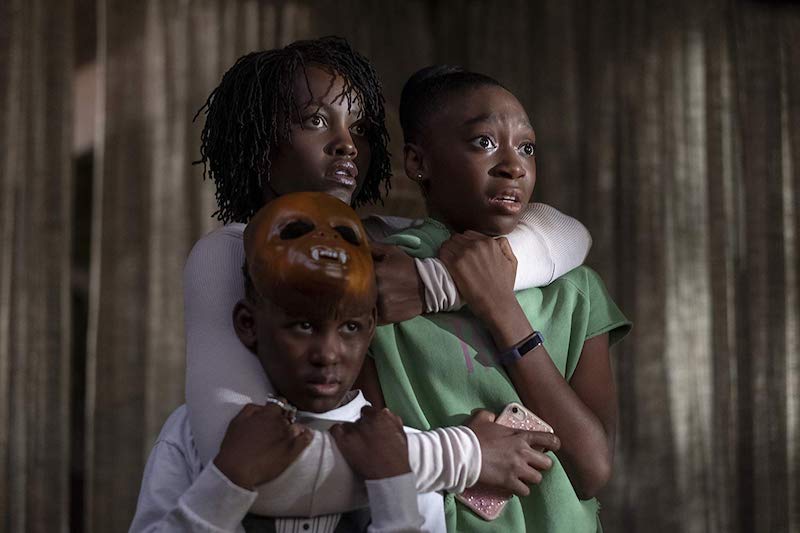Jordan Peele Exposes ‘Us’ for Who We Really Are
The "Get Out" director’s second feature is ambitious, and his blending of horror with social criticism leaves a haunting impression. Lupita Nyong'o, Evan Alex and Shahadi Wright Joseph see something frightening in this still from Jordan Peele's sophomore effort, "Us." (Claudette Barius / Universal Pictures)
Lupita Nyong'o, Evan Alex and Shahadi Wright Joseph see something frightening in this still from Jordan Peele's sophomore effort, "Us." (Claudette Barius / Universal Pictures)
Surely more than once while dreaming, you’ve been aware that you’re in a dream, inside it and outside at the same time. Sleep scientists call such self-aware reveries “lucid dreams.”
So when I describe “Us,” Jordan Peele’s intelligent and unnerving new film, as a “lucid nightmare,” you’ll get my drift. It’s a nightmare you are immersed in while watching yourself watch it.
Like Peele’s directorial debut “Get Out,” the new film—a variation on the theme of “Invasion of the Body Snatchers”—is simultaneously a horror movie, a satire of horror movies and an American parable. It takes place in Santa Cruz, Calif., and chronicles a home invasion of the summer house owned by the Wilsons, played by Lupita Nyong’o and Winston Duke, as the intruders freak out their pubescent daughter and pre-teen son.
In every meaning of the expression, the Wilsons are not alone. Everyone in town appears to have a double who wears a red jumpsuit and wields an unusually large pair of scissors.
“Us” produces the effect of punching the solar plexus while jolting the frontal lobe and, sometimes, provoking laughter. In other words, it scared the bejesus out of me while giving me time to reflect on why I was so scared, and left me breathless from that sock in the gut and the occasional belly laugh, so that I didn’t know whether my screams were of terror or laughter. As with most effective horror films, the pace here is alternately snail-slow and lightning-bolt abrupt.
Peele’s weighty film stands on the slim shoulders of Nyong’o, whose parallel performances as both the survivor of a childhood trauma and her spectral look-alike are respectively poignant and primal. As the ineffectual husband, Duke’s purpose is to provide the kind of comic relief perfected by the director in his work as one half of Comedy Central’s “Key & Peele.” At times, Duke seems like he’s in another movie—not to mention another universe. Yet there are moments when his dead-eye comic spin and Nyong’o’s dead-serious riposte make for something tonally fresh.
Who—or what—are the invaders? They are unlike those in the 1956 version of “Body Snatchers,” out to replace the bodies of individualist Americans with those of groupthink Soviets. The new invaders literally and figuratively are shadow images of those above, rising from abandoned train lines underneath the Santa Cruz boardwalk. “They look like some effed-up performance art,” one character says.
All but one communicates in guttural sounds and feral body language. The one who can communicate in words talks about the people from under, humanoids that seem like survivors of a failed social or medical experiment, like laboratory rats or rabbits or those used for the Tuskegee experiments. She alludes to how they were “tethered without direction.” Tethered to those above, as in slaves? Arising from below, as in the underclass?
While Peele’s sophomore feature is not as fully realized as his debut, it is far more ambitious in its goals. Alas, the exquisite tension of its opening scenes slackens by the payoff. Still, long after the film’s closing credits, the social criticism Peele infuses in “Us” continues to haunt.
Your support is crucial…With an uncertain future and a new administration casting doubt on press freedoms, the danger is clear: The truth is at risk.
Now is the time to give. Your tax-deductible support allows us to dig deeper, delivering fearless investigative reporting and analysis that exposes what’s really happening — without compromise.
Stand with our courageous journalists. Donate today to protect a free press, uphold democracy and unearth untold stories.









You need to be a supporter to comment.
There are currently no responses to this article.
Be the first to respond.